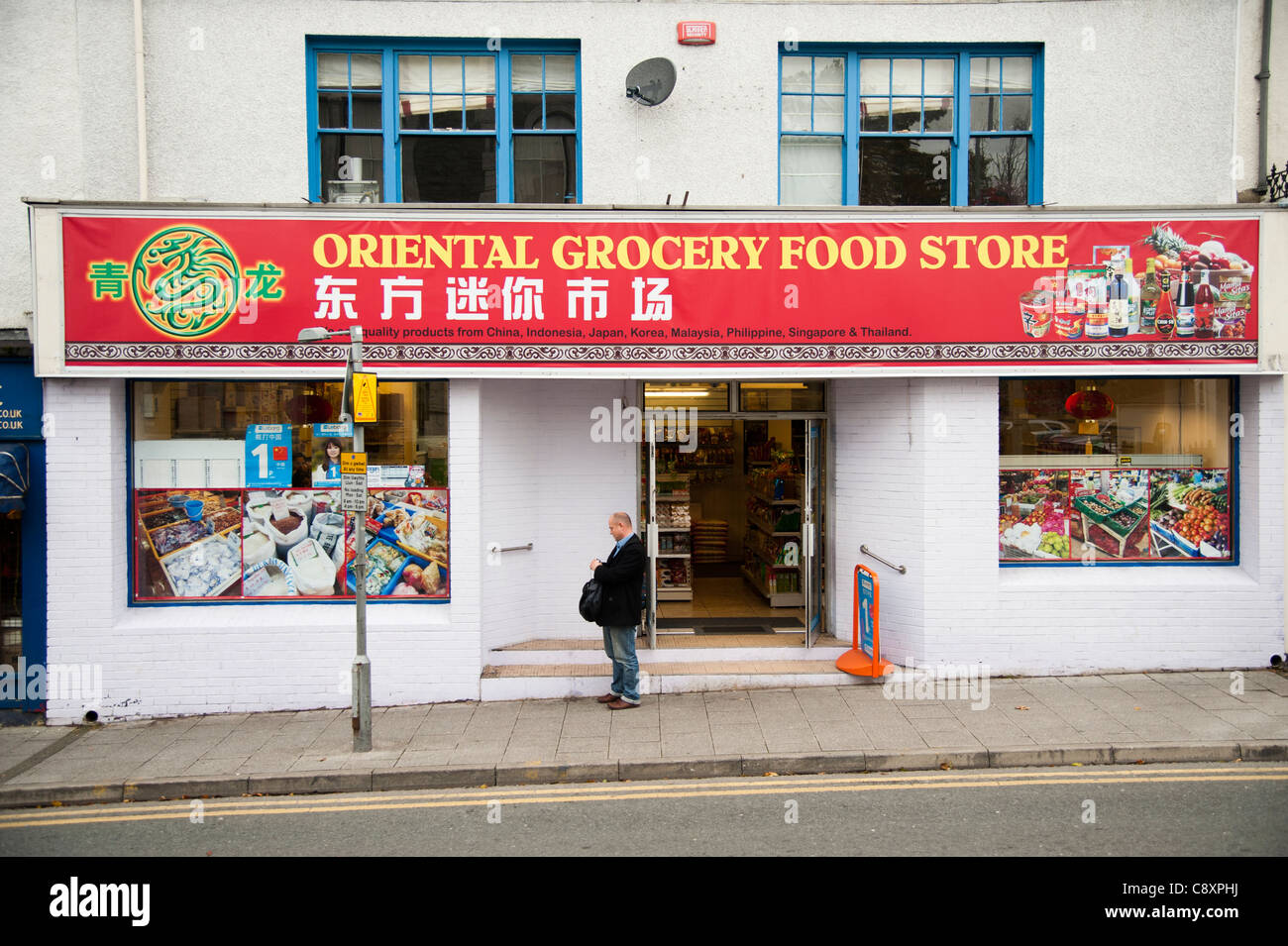Imagine stepping into a little shop tucked away in a bustling neighborhood where the aroma of fresh spices, exotic ingredients, and traditional delicacies greets you like an old friend. This, my friends, is what an Asian food shop does—it brings culture, taste, and community together under one roof. Whether you're craving authentic noodles, fermented soy sauce, or even rare ingredients for your favorite recipes, these shops offer more than just groceries; they serve as gateways to culinary adventures. And trust me, the kind of customers who walk through those doors? They're as diverse and vibrant as the flavors inside!
Asian food shops are not your ordinary grocery stores. They’re treasure troves of cultural heritage, stocked with items you won’t find at regular supermarkets. From sticky rice to kimchi, seaweed snacks to fresh lychees, these shops cater to a wide range of palates and preferences. But what exactly do these shops do? And who are the people behind the counters—or in front of them? Let's dive in and explore this fascinating world!
If you think Asian food shops are just about selling ingredients, think again. These places are hubs of connection, where traditions meet modern tastes. They’re where you can pick up that hard-to-find bottle of fish sauce or grab some fresh lotus root for your next stir-fry. But they’re also where stories are shared, advice is given, and friendships are formed. So, let’s talk about what makes these shops so special and the kinds of customers they attract.
Read also:Ash Kash Onlyfans Leaked The Untold Story Behind The Controversy
What Does an Asian Food Shop Actually Do?
At its core, an Asian food shop serves as a one-stop destination for all things culinary related to Asian cuisine. But it’s not just about selling food—it’s about preserving culture, supporting small businesses, and creating a space where people from different backgrounds can come together over their love for good food. Here’s a breakdown of what these shops typically offer:
- Specialty ingredients like soy sauce, wasabi paste, and curry powder
- Fresh produce such as bok choy, galangal, and Thai basil
- Snacks ranging from Pocky sticks to mango sticky rice desserts
- Imported goods like canned goods, dried noodles, and exotic fruits
- Cooking tools and equipment specific to Asian cooking methods
These shops often go beyond the basics by offering unique items that reflect the diversity within Asian cultures. For example, you might find Korean gochujang next to Japanese miso, or Indian spices alongside Vietnamese herbs. It's this variety that keeps customers coming back for more.
Who Are the Customers of Asian Food Shops?
The beauty of Asian food shops lies in their ability to attract a wide array of customers. Sure, there are the expats and immigrants looking to recreate home-cooked meals thousands of miles away. But there’s also a growing number of curious foodies eager to experiment with new flavors. Let’s take a closer look at the different types of customers you’ll find:
1. Immigrants and Expatriates
For many immigrants and expatriates, visiting an Asian food shop is like stepping back into their homeland. They come seeking comfort foods that remind them of family gatherings, holidays, and everyday meals. Whether it's a Filipina mom searching for calamansi or a Chinese student grabbing a bag of rice dumplings, these shops provide a sense of belonging.
2. Food Enthusiasts
Then there are the food enthusiasts—people who live and breathe culinary exploration. These customers might not have an Asian background, but they’re passionate about learning how to make pad thai or mastering the art of dumpling-making. They’re drawn to the exotic ingredients and the promise of discovering something new.
3. Health-Conscious Shoppers
Asian food shops are also popular among health-conscious shoppers. Many Asian ingredients, like turmeric, green tea, and seaweed, are known for their health benefits. Customers looking for gluten-free, low-sugar, or plant-based options often find exactly what they need in these stores.
Read also:Kitalovexoxo Leak The Buzz The Facts And What You Need To Know
Why Are Asian Food Shops Important?
Asian food shops play a crucial role in both cultural preservation and economic growth. On one hand, they help maintain the traditions and practices of various Asian cultures. On the other hand, they support local economies by providing jobs and opportunities for small business owners. Plus, they contribute to the global appreciation of Asian cuisines, which continues to grow in popularity worldwide.
But perhaps the most important aspect of these shops is the sense of community they foster. Walk into any Asian food shop, and you’ll likely see people chatting, sharing recipes, and exchanging tips. It’s this human connection that sets them apart from corporate chains.
How Do Asian Food Shops Stand Out?
In a world dominated by big-box retailers and online grocery delivery services, Asian food shops manage to thrive by offering something unique. Here are a few reasons why:
- They specialize in niche products that cater to specific cultural needs.
- They provide personalized service, often with staff who understand the nuances of Asian cooking.
- They create a welcoming atmosphere where customers feel valued and respected.
- They offer competitive pricing on imported goods compared to larger supermarkets.
While some may argue that online shopping has made physical stores obsolete, Asian food shops prove otherwise. There’s nothing quite like browsing the aisles, touching the produce, and asking questions face-to-face. It’s an experience that simply can’t be replicated online.
Challenges Faced by Asian Food Shops
Of course, running an Asian food shop isn’t without its challenges. From navigating supply chain disruptions to competing with multinational corporations, owners face numerous obstacles. Additionally, changing consumer preferences and rising rents in urban areas can make it difficult to keep prices low and maintain profitability.
Despite these hurdles, many shop owners persevere because they believe in the mission of preserving cultural heritage and serving their communities. Some even adapt by incorporating e-commerce platforms or hosting cooking classes to attract younger audiences.
Key Benefits of Shopping at Asian Food Shops
So, why should you consider shopping at an Asian food shop instead of sticking to your usual grocery store? Here are a few compelling reasons:
- You’ll gain access to authentic ingredients that are hard to find elsewhere.
- You’ll learn about new foods and cooking techniques from knowledgeable staff.
- You’ll support small businesses and contribute to your local economy.
- You’ll enjoy fresher, higher-quality produce than what’s typically available in supermarkets.
Plus, there’s the added bonus of being surrounded by like-minded individuals who share your passion for good food. Who wouldn’t want to be part of that?
Success Stories: Notable Asian Food Shops Around the World
There are countless success stories of Asian food shops making waves in their respective communities. Take, for instance, 99 Ranch Market, one of the largest Asian grocery chains in North America. Founded in Southern California, it now boasts over 40 locations across the United States and Canada. Or consider Tesco Lotus in Thailand, which combines traditional markets with modern convenience.
These shops didn’t just happen overnight; they succeeded because they understood their customers’ needs and delivered exceptional value. By staying true to their roots while embracing innovation, they’ve managed to carve out a niche in a highly competitive industry.
Future Trends in the Asian Food Shop Industry
Looking ahead, the future of Asian food shops appears bright. As globalization continues to blur cultural boundaries, there’s an increasing demand for authentic experiences. We’re already seeing trends like:
- More focus on sustainability and eco-friendly packaging
- Increased adoption of digital technologies for inventory management
- Growth in hybrid models combining brick-and-mortar stores with online sales
- Rising interest in fusion cuisines that blend Asian flavors with other global influences
These trends suggest that Asian food shops will continue to evolve while maintaining their core identity. And as long as there are people who love great food, these shops will remain relevant.
Conclusion: Why Asian Food Shops Matter
To sum it up, Asian food shops do more than just sell food—they bring people together. They celebrate diversity, honor tradition, and inspire creativity in the kitchen. The kinds of customers they attract reflect the richness of our global community, from expats yearning for home to adventurous cooks eager to learn.
So next time you’re in the mood for something different, why not visit your local Asian food shop? You might just discover a new favorite ingredient—or even a new friend. And if you enjoyed reading this article, don’t forget to leave a comment, share it with others, or explore more articles on our site. Together, let’s keep the spirit of good food alive!
Table of Contents
What Does an Asian Food Shop Actually Do?
Who Are the Customers of Asian Food Shops?
Why Are Asian Food Shops Important?
How Do Asian Food Shops Stand Out?
Challenges Faced by Asian Food Shops
Key Benefits of Shopping at Asian Food Shops
Success Stories: Notable Asian Food Shops Around the World


